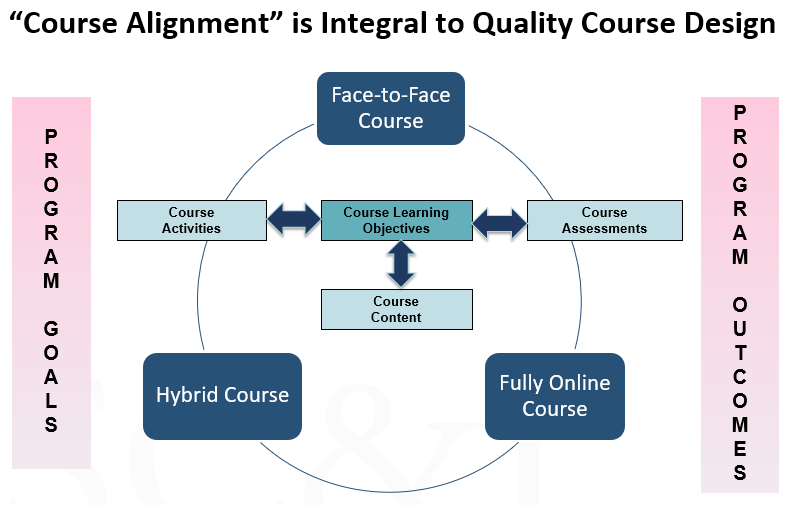Learning Experience Design with High Impact!
 Denise Kreiger Consulting, LLC, works collaboratively with higher education institutions, K-12 schools, and corporations throughout the course design and development process.
Denise Kreiger Consulting, LLC, works collaboratively with higher education institutions, K-12 schools, and corporations throughout the course design and development process.
This includes mentoring and guiding faculty, teachers, and/or staff to incorporate instructional strategies and technology that are based on sound pedagogical practices grounded in learning theory in classroom-based, hybrid/blended, and online deliveries.
Collaboration | Design Process | Instructional Strategies with Technology | Learning Theory
Collaboration with Faculty, Teachers, and Staff to Design Courses and Learning Experiences that . . .
-
-
- Are fully “aligned” with course learning objectives, program goals, and/or core curriculum standards.
- Promote student-centered learning.
- Develop higher-order thinking/skills.
- Provide engaging, socially-connected learning opportunities.
- Incorporate technologies to enhance learning.
- Deconstruct projects and provide “scaffolding” in assignments to help students succeed and meet the learning goals.
- Provide grading rubrics to evaluate students’ work and communicate expectations & desired outcomes.
- Include ‘authentic’ assessments – formative and summative – beyond more traditional assessments (i.e., tests, papers).
- Assure high-quality learning experiences based on industry standards (e.g., Quality Matters).
- Promote independent learning.
- Promote accessibility & universal design.
- Put “pedagogy” first!
-
Learning Design Process
The process may vary depending on whether the goal is to design/develop a full-semester course, multiple courses in a curriculum, a professional development course for a certificate, or one specific project or micro learning experience. Below is an example of a more formal, instructional design approach to assure the integrity of the process.
- Learning Needs Assessment
Audience analyses (instructors & learners)
Goals of course, curriculum, program
Existing course redesign vs. new course design vs. course transition (e.g., from face-to-face class to hybrid or fully online)
Design/development team (e.g., faculty/teacher – SME; instructional designer/technologist)
Timeline for project and time commitment by team
- Course Design/Course Mapping
Course learning objectives
Course assessments
Course outline of units, topics, and activities and assignments
Ensure “course alignment” throughout the course

Course Alignment Supports Quality Course Design
Product: Course Syllabus with Schedule; “blueprint” for course development. - Course Development
Develop course in a learning management system or platform
Develop course structure
Develop prototypes, models, templates, and/or samples
Develop week-by-week units of study:
– Readings
– Media and/or technology
– Lecture
– Activities
– Assignments
- Course Implementation
Facilitate the learning process while teaching the course
Build a learning “community”
Communicate with students
Provide ongoing feedback and grading of assignments
Note any issues or problems
- Course Evaluation
Post-course faculty/instructor course debriefing with ID
Evaluate successes, challenges, & issues to resolve
Review student/user statistics and performance
Review student surveys for feedback
Fine-tune and/or revise course, as needed.
Instructional Strategies with Technology Integration

 This work (Collaboration, by Startup Stock Photos via Pexels – CC0 license) is free of known copyright restrictions.
This work (Collaboration, by Startup Stock Photos via Pexels – CC0 license) is free of known copyright restrictions.
Incorporating instructional strategies that promote higher-order thinking/skills and active learning with technology integration, such as:
- Asynchronous Online Discussions
- Flipped Classroom (hybrid & face-to-face learning)
- Digital Storytelling (e.g., Piktochart for infographics; Storybird, Voicethread)
- Project-Based Learning
- Inquiry/Problem-Based Learning
- Experiential/Applied Learning (e.g., in the “field”)
- Collaborative Learning (e.g., “curating” content; presentations; Google Apps, Google Sites)
- Case Study
- Social Media (Twitter, Diigo social bookmarking, Wikis, Facebook, Pinterest, blogging, GroupMe, Slack)
- Video (e.g., YouTube, TED Talks, Khan Academy; recorded instructor lectures)
- Game-Based Learning
- Debate
- Peer Review
- Critical Reflection
Learning Theory
Instructional strategies and approaches are grounded in learning theories, such as:
- Bloom’s Taxonomy
- Constructivism/Social Constructivism
- Community of Inquiry
- Lave/Wenger’s Communities of Practice
- Vygotsky’s Scaffolding
- Dewey/Kolb’s Experiential Learning
- Gardner’s Multiple Intelligences
- Mayer’s Cognitive Theory of Multimedia Learning
- Sweller’s Cognitive Load Theory
- Mezirow’s Transformative Learning
- 21st Century Skills
